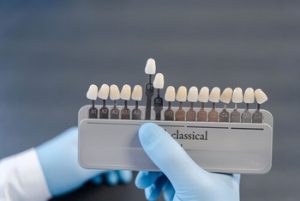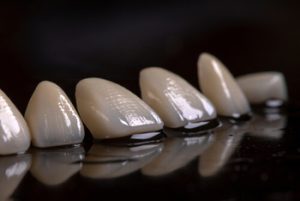Ever wondered how a dental crown can bring life back to a damaged tooth? Imagine a little shield for your smile—a crown that protects and restores your tooth’s look and strength. It’s a powerful solution that can make eating, talking, and smiling feel natural again. In this article, we’ll walk you through what happens during the dental crown procedure and why it’s such a popular choice.
What Exactly Are Dental Crowns?
Crowns are coverings that go over teeth to strengthen them and return their proper shape. They come in different types, such as metal crowns, which are durable and long-lasting, and zirconia crowns, known for their natural appearance and toughness. Each type serves unique needs, offering solutions based on the tooth’s location and function.
How Is the Dental Crown Procedure Done?
Preparing for a Dental Crown Procedure
The dental crown procedure begins with a detailed assessment of the tooth in question. Your dentist examines the tooth’s condition, looking for signs of tooth decay or damage that might affect the treatment. They also check the surrounding teeth and gums to ensure the area is healthy enough for the process. This evaluation helps to decide if the tooth needs additional preparation, like root canal treatment, before moving forward.
Shaping the Tooth for the Crown
Temporary Crown Placement
Once the tooth is reshaped, an impression is taken to create a custom crown. This mould captures the exact size and shape needed for a snug fit. While the permanent crown is being made, a temporary dental crown is placed over the prepared tooth. The temporary crown placement helps protect the tooth and maintain function during this waiting period, which usually lasts a couple of weeks.
Creating the Custom Crown
The mould is sent to a dental lab, where experienced technicians make the tooth crown. They use materials like porcelain, metal, or ceramic, depending on the distinct needs of the patient. For those with discoloured teeth, the dentist may choose a material that closely resembles the natural shade, ensuring the dental crown placement looks seamless.
Fitting the Permanent Crown
When the permanent crown is ready, it’s time for the final step in the crown procedure. The dentist removes the temporary tooth crown and cleans the tooth thoroughly. The new crown is placed over the prepared tooth and adjusted to achieve the best fit and alignment. Once satisfied, the dentist bonds the crown securely using special dental cement, completing the dental crown treatment.
This straightforward process ensures that your smile stays strong and beautiful, giving you confidence in your oral health.
Why Are Dental Crowns a Great Choice for Your Smile?
Dental crowns blend strength and beauty, offering both practical and cosmetic benefits. Let’s explore why crowns are such a popular choice for enhancing smiles and how they might work for you.
A Shield for Weak or Damaged Teeth
Crowns act like a protective cover for teeth that are chipped, cracked, or worn down. By sitting snugly over the affected tooth, they provide extra strength and prevent further damage. For teeth with large fillings or decay, crowns can stabilise the structure and stop problems from worsening. Unlike other treatments that might leave your tooth exposed, a crown completely surrounds it, giving long-lasting support.
Restoring a Natural Look
One of the most appealing things about dental crowns is their ability to look just like natural teeth. Using porcelain or ceramic, they are custom-coloured to blend perfectly with your teeth, making your smile look natural and smooth.
Whether your concern is a discoloured tooth or one that doesn’t align well with others, a crown can restore both appearance and function.
Comfortable and Custom-Fit
Crowns are designed specifically for your tooth, making them a custom solution that fits perfectly. This precision ensures they feel comfortable in your mouth, making chewing and speaking easier. Unlike temporary fixes, crowns are made to stay in place and work smoothly with your bite.
Durable and Long-Lasting
When it comes to longevity, tooth crowns are hard to beat. With proper care, they can last many years, offering a durable solution to many dental issues. While regular dental check-ups are important for all treatments, crowns require no special maintenance beyond good oral hygiene practices.
Supporting Other Dental Treatments
Crowns also play a key role in supporting treatments like dental implants. For example, after a dental implant is placed, a crown is attached to it, forming the visible part of your new tooth. This combination provides a strong and stable replacement for missing teeth while enhancing your smile’s appearance.
Boosting Confidence in Your Smile
Maintaining Dental Health
Crowns don’t just restore teeth; they also help maintain the overall health of your mouth. By covering and protecting damaged teeth, they prevent the spread of decay or fractures to nearby teeth. This proactive approach can save you from needing more extensive treatments in the future.
Is a Crown Right for You?
Dental crowns are suitable for an array of dental concerns, making them a versatile choice. If you have damaged teeth or are considering ways to enhance your smile, a crown could be the solution you’re looking for. Always consult with your dentist to determine the most appropriate treatment for your needs.
Dental crowns combine function and beauty to give you a smile that’s strong, natural-looking, and full of confidence. Whether you’re dealing with tooth damage or just want to upgrade your smile, crowns are a trusted option for long-term results.
What Steps Can You Take to Keep Your Dental Crowns in Top Shape?
Dental crowns are a great way to protect and improve your teeth, but they need proper care to last. With the right habits, you can keep your crowns strong and looking their best. Let’s explore the steps you can take to maintain them.
Brush Gently, But Thoroughly
Caring for your crowns starts with regular brushing. Use a soft-bristled toothbrush and mild toothpaste to clean your teeth twice a day. Pay close attention to the area around the crown, where it meets the gumline. This area is especially important because plaque can build up and lead to gum issues if not cleaned properly. Gentle brushing helps protect both your crown and the surrounding teeth.
Floss Every Day
Flossing isn’t just for your natural teeth—it’s crucial for keeping your crowns in good condition, too. Make it a habit to floss daily, sliding the floss gently around your crowned tooth to remove food particles and plaque. Special floss or interdental brushes can make it easier to clean between teeth and under the edges of your crown.
Avoid Chewing Hard or Sticky Foods
Crowns are strong, but they’re not indestructible. Avoid chewing on ice, hard lollies, or other tough foods that could chip or crack the crown. Sticky foods like toffee or gum can also be problematic, as they might pull on the crown or loosen it over time. Stick to foods that are kinder to your teeth and crowns.
Protect Your Teeth at Night
Grinding your teeth at night can harm your crown. Speak with your dentist about getting a nightguard to keep your teeth safe. These guards act as a cushion, reducing the stress on your crowns and helping them last longer.
Stay Hydrated for Better Oral Health
Water helps rinse food away and keeps your mouth hydrated, which is great for dental health. A dry mouth can cause decay, which can affect the teeth under your crowns. Sipping water throughout the day is a simple way to support your crowns and gums.
Visit Your Dentist Regularly
Regular dental visits are key to maintaining your crowns. During these check-ups, your dentist will examine the crowns for any signs of wear or damage and ensure they’re still fitting properly. Professional cleaning also removes plaque and tartar build-up, keeping your mouth in top shape.
Be Mindful of Teeth Whitening Products
While crowns don’t stain like natural teeth, whitening products won’t change their colour either. If you plan to whiten your teeth, it’s best to do so before getting a crown so everything matches perfectly. Speak to your dentist about the best options for keeping your smile bright.
Know When to Call Your Dentist
If you notice your crown feels loose, experiences sensitivity, or shows signs of damage, don’t ignore it. Contact your dentist immediately to prevent further issues. Addressing problems early can save you time and discomfort later.
Long-Lasting Results with Proper Care
Dental crowns are designed to last for many years, but their lifespan depends on how well you care for them. By following these simple steps, you can enjoy a strong, healthy smile and keep your crowns looking and feeling great for years to come.
What Foods Should You Eat and Stay Away From with a Dental Crown?
Having a dental crown means you can enjoy eating again without discomfort or sensitivity, but it’s important to choose the right foods. Making smart food choices will help protect your crown and keep it in great condition for years to come. Let’s break down the foods that are good and those you should avoid.
Foods That Are Friendly to Your Dental Crown
Soft Fruits and Cooked Vegetables: Fresh, soft fruits like bananas, melons, and berries are gentle on your crown and easy to chew. Cooked vegetables, such as carrots or broccoli, are also excellent options because they don’t require much pressure to bite into. These foods are healthy, delicious, and safe for your dental crown.
Lean Proteins: Foods like fish, chicken, and tofu are not only nutritious but also easy to chew. They don’t put unnecessary strain on your teeth, making them ideal choices for meals when you have a crowned tooth.
Dairy Products: Yoghurt, cheese, and milk are great for your teeth and dental crown because they’re soft and rich in calcium. These foods support the health of your surrounding teeth and gums, keeping your mouth in top shape.
Soft Grains and Breads: Opt for cooked rice, pasta, and soft bread that won’t stress your crown during chewing. These foods are filling and safe, making them a reliable part of your diet.
Foods to Avoid for Long-Lasting Crowns
Sticky and Chewy Treats: Foods like caramel, taffy, and sticky lollies can pull on your crown, loosening or even dislodging it. These treats might seem tempting, but they can create long-term problems.
Hard Foods: Biting into hard foods like nuts, ice, or hard lollies can cause cracks or chips in your crown. Save your dental work by steering clear of these potentially damaging foods.
Crunchy Snacks: Potato chips and popcorn kernels can be tough on a crowned tooth, especially if they get stuck in hard-to-clean areas. Opt for softer snacks to avoid any unnecessary stress on your dental crown.
Acidic and Sugary Foods: Sugary sodas, citrus fruits, and other acidic foods can weaken your tooth structure over time. Although crowns are durable, these foods can still impact the teeth around them, leading to issues like sensitivity or decay.
Eating Habits That Protect Your Crown
Chew Mindfully: Try not to chew on just one side of your mouth. Evenly distributing the pressure across your teeth can prevent unnecessary wear on your crown.
Avoid Extreme Temperatures: Foods and drinks that are too hot or cold might cause sensitivity, especially if your crowned tooth hasn’t fully adjusted. Enjoy meals at moderate temperatures to stay comfortable.
Take Your Time: Rushing through meals increases the chance of accidentally biting into hard or harmful objects. Chew slowly and enjoy your food to keep your crown safe.
Why Smart Food Choices Matter
If you’re unsure about the best foods for your dental crown, don’t hesitate to speak with your dentist. A little care goes a long way in keeping your smile strong and healthy!
Start Your Journey to a Better Smile Today
Completing the dental crown procedure can bring comfort and restore your smile. Whether you need help protecting a weak tooth or fixing damage, we’re here to assist. Our clinic provides a caring approach to help you feel at ease throughout the process. Ready to take the next step? Please call us at 07 4801 7035 today to discuss your needs and plan your treatment.
References:
https://my.clevelandclinic.org/health/treatments/10923-dental-crowns
https://www.news-medical.net/health/Procedure-for-Dental-Crowns.aspx



